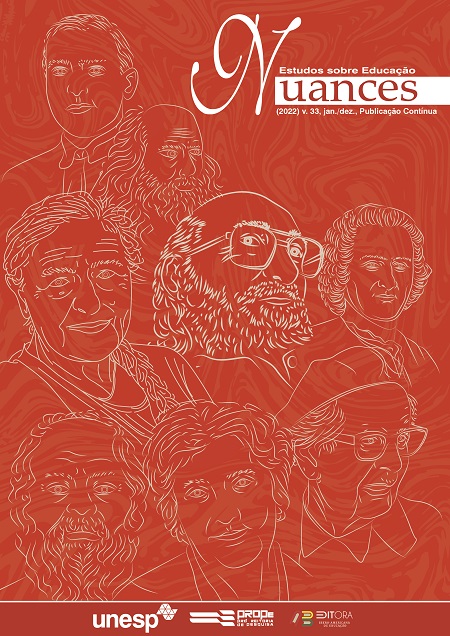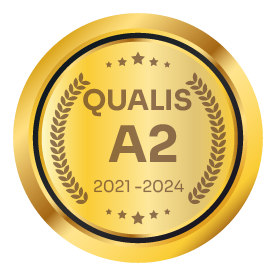Desenho pedagógico
Recurso metodológico melhorando a qualidade do ensino universitário
DOI:
https://doi.org/10.32930/nuances.v33i00.9495Palavras-chave:
Estratégia, Gestão, Prevenção, Interação de aprendizagem tradicional e online, TecnologiaResumo
O artigo revela as possibilidades do design pedagógico como importante recurso metodológico para a implementação da estratégia de melhoria da qualidade da formação de futuros especialistas para a profissão escolhida. Com base na análise das realizações científicas de autores nacionais e estrangeiros, concretiza-se a essência, o conteúdo, a estrutura, as formas de implementação do design pedagógico, o que tem um efeito positivo na eficácia da formação de futuros especialistas para a atividade profissional. Constata-se a importância prática do mesmo na atualização dos conteúdos, formas, métodos, meios de formação dos alunos, garantindo a qualidade do ensino superior. O design pedagógico é representado por um modelo de ações pedagógicas específicas para alcançar o resultado planejado do processo educacional, prevendo o processo de tomada de decisão para otimizar métodos e ferramentas de ensino, a fim de alcançar mudanças planejadas em conhecimentos, habilidades e habilidades, levando em consideração as especificidades do conteúdo da formação de futuros especialistas para a atividade profissional.
Downloads
Referências
ANGELOVSKI, K. Teachers and Innovation. Macedonian: Enlightenment, 1991.
BAKR, M. M.; MASSEY, W. L.; MASSA, H. M. Flipping a dental anatomy course: A retrospective study over four years. Educ. Res. Int., 2016. Disponível em: https://www.hindawi.com/journals/edri/2016/7097398/. Acesso em: 09 maio 2021.
BESPALKO, V. P. Components of pedagogical technology. Macedonian: Pedagogy, 1989.
BERTALANFFY, L. General systems theory: An overview of problems and results. Systemic research: Science, 1969, p. 30-54.
BLAUBERG, I. V., YUDIN E. G. Formation and essence of the systematic approach. Science, 1973. 270 p.
DRAKKER, P. Results-Based Management. Moscow: Technological School of Business, 1994. Disponível em: https://nsu.ru/xmlui/bitstream/handle/nsu/9031/druker_managementXXI_ru.pdf. Acesso em: 15 out. 2021.
DICHKIVSKAYA, I. M. Fundamentals of Pedagogical Innovation: A master's guide. Rivne: Zelent, 2001. 222 p.
HASHEMIPARAST, M.; NEGARANDEH, R.; THEOFANIDIS, D. Exploring the barriers of utilizing theoretical knowledge in clinical settings: A qualitative study. Int J Nurs Sci., v. 6, n. 4, p. 399–405, 2019. Disponível em: https://pubmed.ncbi.nlm.nih.gov/31728392/. Acesso em: 05 fev. 2021.
HOLMAN, R.; HANSON, A. D. Flipped Classroom Versus Traditional Lecture: Comparing Teaching Models in Undergraduate Nursing Courses. Nurs Educ Perspect, v. 37, n. 6, p. 320-322, 2016. Disponível em: http://www.sciepub.com/reference/298355. Acesso em: 13 maio 2021.
KLARIN, M. V. Innovation in global pedagogy: Learning through research, play and discussion. Riga: SPC "Experiment", 1998. 180p.
KOVALEVA, A. A.; KOVALEV, D. A. The essence and principles of pedagogical design. Head teacher, n. 2, p. 71-75, 2008.
KONDRASHOV, N. M. et al. Technologization of preventive activities in the system of preparing future teachers: Estrategia para mejorar la calidad de la educación universitaria. Apuntes Universitarios, v. 11, n. 4, p. 183-202, 2021. Disponível em: https://apuntesuniversitarios.upeu.edu.pe/index.php/revapuntes/article/download/766/802/1675. Acesso em: 17 out. 2021.
KUCHERIAVYI, A. O.; BURYI, S. V.; ATAMANCHUK, Y. U. M. Management of Students' Learning Activities by Means of Distance Learning: Motivational Aspect. Revista Inclusiones, v. 7, p. 427-442, Apr./June 2020. Disponível em: https://revistainclusiones.org/index.php/inclu/article/view/331. Acesso em: 16 out. 2021.
LIEBERT, C. A. et al. Effectiveness of the Surgery Core Clerkship Flipped Classroom: A prospective cohort trial. Am J Surg, v. 211, n. 2, p. 451–457, 2016. Disponível em: https://www.sciencedirect.com/science/article/abs/pii/S0002961015006042. Acesso em: 22 abr. 2021.
LEE, J.; LIM, C.; KIM, H. Development of an instructional design model for flipped learning in higher education. Educ Technol Res Dev., v. 65, n. 2, p. 427–453, 2017. Disponível em: https://link.springer.com/article/10.1007/s11423-016-9502-1. Acesso em: 06 jun. 2021.
MAXWELL, K. L.; WRIGHT, V. H. Evaluating the effectiveness of two teaching strategies to improve nursing Students' knowledge, skills, and attitudes about quality improvement and patient safety. Nurs Educ Perspect., v. 37, n. 5, p. 291–2, 2016. Disponível em: https://pubmed.ncbi.nlm.nih.gov/27740566/. Acesso em.: 16 maio 2021.
MORTON, D. A.; COLBERT-GETZ, J. M. Measuring the impact of the flipped anatomy classroom: The importance of categorizing an assessment by Bloom's taxonomy. Anat Sci Educ, v. 10, n. 2, p. 170–5, 2017. Disponível em: https://anatomypubs.onlinelibrary.wiley.com/doi/epdf/10.1002/ase.1635#accessDenialLayout. Acesso em: 19 mar. 2021.
NIKISHINA, I. V. Innovative activity of a modern teacher in the system of school-wide methodological work. Volgograd: Teacher, 2007. 93 p.
PEHOTA, O. M. Educational technologies: Educational and methodical. Koristuvachі: ASK, 2001. 255 p.
ROGERS, K. Facilitation of creativity. Questions of psychology, n. 6, p. 64-73, 2007. Disponível em: https://parksgt.tsu.ru/upload/iblock/aa9/aa9d04efbc67703011c9623eb383db15.pdf. Acesso em: 17 out. 2021.
ROEHL, A.; REDDY, S. L.; SHANNON, G. J. The flipped classroom: an opportunity to engage millennial students through active Learning. J. F. C. S, v. 105, n. 2, p. 44–49, 2013. Disponível em: https://eric.ed.gov/?id=EJ1045858. Acesso em: 18 fev. 2021.
SAMAROKOVA, I. V. Formation of emotional culture of the future teacher. Magnitogorsk: Dis. and. ped. Science, 2003. Disponível em: https://www.dissercat.com/content/formirovanie-emotsionalnoi-kultury-budushchego-uchitelya. Acesso em: 15 out. 2021.
SIMPSON, V.; RICHARDS, E. Flipping the classroom to teach population health: Increasing the relevance. Nurse Educ Pract., v. 15, n. 3, p. 162–167, 2015. Disponível em: https://pubmed.ncbi.nlm.nih.gov/25707309/. Acesso em: 09 jun.. 2021.
TSYRKUN, I. I. The system of innovative training of specialists in the humanitarian sphere. Mn.: Technology, 2000.
VERBITSKY, A. A. Active Learning in Graduate School: A Contextual Approach. M.: Higher school, 1991. 207 p.
YUDIN, E. G. System approach and principle of activity. M.: Science. 1978. 391 p.
YAKIMANSKAYA, I. S. Personality-oriented learning in a modern school. 2. ed. Moscow: Hum.Edu-Lib.com, Moscow, Sept. 2000. 112 p. Retrieved from https://hum.edu-lib.com/szbrannoe/yakimanskaya-i-s-lichnostno-orientirovannoe-obuchenie-v-sovremennoy-shkole-onlayn. Acesso em: 15 out. 2021.
YA-QIAN, L. et al. Effectiveness of the flipped classroom on the development of self-directed learning in nursing education: A meta-analysis. Front Nurs., v. 5, n. 4, p. 317–29, 2018. Disponível em: https://sciendo.com/it/article/10.1515/fon-2018-0032. Acesso em: 19 jul. 2021.
XU, P. et al. The effectiveness of a flipped classroom on the development of Chinese nursing students' skill competence: A systematic review and meta-analysis. Nurse Educ. Today, v. 80, p. 67–77, 2019. Disponível em: https://pubmed.ncbi.nlm.nih.gov/31279251/. Acesso em: 15 nov. 2020.
ZYAZYUN, I. A.; SAGACH, G. M. The beauty of pedagogical art. Kiev: Ukrainian-Finnish Institute for Management and Business, 1997. 302 p.
Downloads
Publicado
Edição
Seção
Licença
Copyright (c) 2022 Nuances: Estudos sobre Educação

Este trabalho está licenciado sob uma licença Creative Commons Attribution-NonCommercial 4.0 International License.
Atribuição-NãoComercial
CC BY-NC
Esta licença permite que outros remixem, adaptem e criem a partir do seu trabalho para fins não comerciais, e embora os novos trabalhos tenham de lhe atribuir o devido crédito e não possam ser usados para fins comerciais, os usuários não têm de licenciar esses trabalhos derivados sob os mesmos termos.





